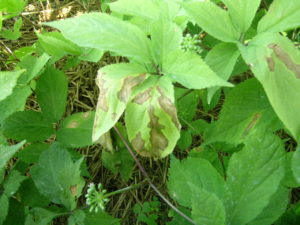Ginseng and lowbush blueberries are vastly different crops, but growers have one common foe that can end their growing season: fungal disease. Now, thanks to international partnerships and research conducted by the IR-4 Project, ginseng and lowbush blueberry growers have a new tool to keep their crop yields healthy and strong.
Aprovia® Top Fungicide, marketed by Syngenta and featuring the active ingredients benzovindiflupyr and difenoconazole, was recently approved for in-season use to fight Septoria leaf spot and blueberry leaf rust on lowbush blueberries, as well as Alternaria blight and powdery mildew on ginseng.

Fighting Leaf Spot on Lowbush Blueberries
In 2018, the IR-4 Project received a request from the state of Maine for the use of Aprovia Top on lowbush blueberry to manage the emergence of blueberry leaf rust. Leaf rust causes significant early leaf loss, which can result in fewer flower buds the following year and impact the overall health of the plant. At the time, Aprovia was not approved for use on food crops in the United States.
Dr. Seanna Annis, associate professor of mycology and associate extension professor at the University of Maine, had conducted field trials with Aprovia Top in 2017 to look at the effectiveness of the fungicide on controlling leaf spot on wild blueberries.
“Aprovia significantly decreased Septoria leaf spot symptoms in July, August and September compared to the check plots,” said Annis. “There was no phytotoxicity and no effect on flower cluster buds counted at the end of September.”
The ChemSAC committee of the U.S. Environmental Protection Agency approved the use of data collected in 2016 in Nova Scotia by Agriculture and Agri-Food Canada to support a proposed tolerance approval for the use of Aprovia Top on lowbush blueberries in the United States.
The EPA approved the tolerance in the spring of 2021, allowing for international harmonization of this tool across lowbush blueberry growing regions in the U.S. and Canada.
Fighting Disease on Ginseng
Each year, ginseng growers in Wisconsin and Michigan battle Alternaria leaf blight on their crops. Alternaria leaf blight is an aggressive fungus that can defoliate plants and reduce root size and yield. This is detrimental for ginseng growers who are paid based on root yield, shape, and size.
According to Joe Heil, founder of Heil Ginseng Inc. in Edgar, Wisconsin, this pathogen has developed resistance to a commonly-used fungicide, putting the industry at great risk.
The Ginseng Board of Wisconsin reached out to Michigan State University plant pathologist Dr. Mary Hausbeck for assistance. Hausbeck was working with Michigan ginseng growers and developed a regional effort that combines the pest management issues of both states.
“She looked at the disease control tools we had available and quickly realized that ginseng growers didn’t have any effective controls,” said Heil. “Being a small specialty crop industry, we couldn’t afford to conduct our own research or solicit chemical companies or EPA to expand labels. That’s when Dr. Hausbeck introduced us to the IR-4 Project.”
Hausbeck and her team conducted efficacy studies of Aprovia Top on ginseng before the project became a priority at IR-4. This data, along with data from IR-4 sponsored trials ultimately led to the U.S. EPA approval of Aprovia Top for use on ginseng in spring of 2021.
“We can actually grow a very high-quality crop because we now have the control products that can be rotated, which has eliminated many of the resistance issues,’ said Heil. “Without IR-4 and without the ability to fund some of these research programs, we wouldn’t have the control products we need.”
About the IR-4 Project
The mission of the IR-4 Project is to facilitate regulatory approval of sustainable pest management technologies for specialty crops and specialty uses to promote public well-being. By working directly with local crop growers across the country, IR-4 conducts research and develops data necessary for the registration of pest management tools, ensuring that they are safe for use. To learn more, visit our website.
